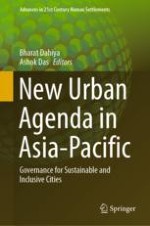2020 | OriginalPaper | Buchkapitel
Urban Policies in Neo-Liberal India
verfasst von : Debolina Kundu
Erschienen in: New Urban Agenda in Asia-Pacific
Verlag: Springer Singapore
Aktivieren Sie unsere intelligente Suche, um passende Fachinhalte oder Patente zu finden.
Wählen Sie Textabschnitte aus um mit Künstlicher Intelligenz passenden Patente zu finden. powered by
Markieren Sie Textabschnitte, um KI-gestützt weitere passende Inhalte zu finden. powered by
